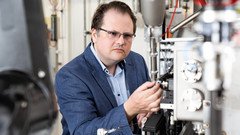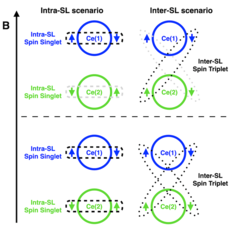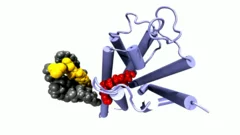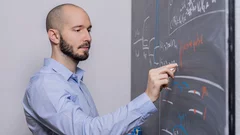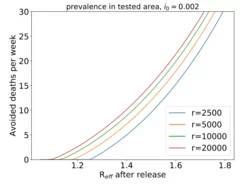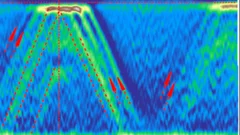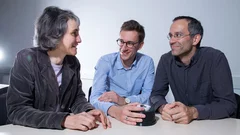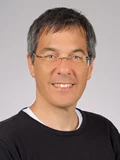Scientific Highlights
Protein distancing
PSI researchers have developed a new method to attach proteins to the surface of virus-like particles.
How immune cells are activated
A research consortium has deciphered the mechanism of CCR5 receptor activation, providing insights for the development of CCR5 drug antagonists for AIDS, cancer, and inflammatory diseases.
Two scenarios for superconductivity in CeRh2As2
CeRh2As2, a nonsymmorphic heavy fermion material, was recently reported to host a remarkable temperature versus z-axis magnetic-field phase diagram with two superconducting phases. In this material, the two inequivalent Ce sites per unit cell, related by inversion symmetry, introduce a sublattice structure corresponding to an extra internal degree of freedom. In this work, we propose a classification of the possible superconducting states in CeRh2As2 from the two Ce-sites' perspective.
Watching receptor proteins changing shape
In our bodies, G protein-coupled receptors mediate countless processes. PSI researcher Ramon Guixà talks about how he brings those receptor molecules to life on the computer screen.
New blueprint for more stable quantum computers
PSI researchers have shown how faster and better defined quantum bits can be created. The central elements are magnetic atoms from the class of so-called rare-earth metals, selectively implanted into the crystal lattice of a material.
Benefit of random testing
With the imminent relaxation of socio-economic restrictions, it becomes vital to assess its effect on the prevalence of acute infections within the population, as rapidly as possible. Currently available monitoring instruments for the COVID-19 pandemic have an inherent time delay of about 14 days, as they rely on confirmed infections, hospitalizations, and death numbers. These methods give Reff(t) (the number of infections caused by a single infected person), but their delay is a significant disadvantage when restrictions are released. If after relaxation, Reff(t) rises above 1, one will not be able to react adequately before two weeks have passed during which time the prevalence could significantly rise. Here, we propose the use of random testing to shorten this reaction time, by obtaining direct and modeling dependent information on Reff(t). Through random testing of between 2500 and 20000 people per day, we find that over periods significantly shorter than two weeks, it becomes possible to detect a dangerous increase in Reff with reasonable confidence.
Spin fluctuation induced Weyl semimetal state in the paramagnetic phase of EuCd2As2
Weyl fermions as emergent quasiparticles can arise in Weyl semimetals (WSMs) in which the energy bands are nondegenerate, resulting from inversion or time-reversal symmetry breaking. Nevertheless, experimental evidence for magnetically induced WSMs is scarce. Here, using photoemission spectroscopy, we observe that the degeneracy of Bloch bands is already lifted in the paramagnetic phase of EuCd2As2. We attribute this effect to the itinerant electrons experiencing quasi-static and quasi–long-range ferromagnetic fluctuations.
New material with magnetic shape memory
PSI researchers have developed a material whose shape memory is activated through magnetism. Application areas for this new kind of composite material include, for example, medicine, space flight, electronics, and robotics.
EPFL Adjunct Professorship to Christopher Mudry
Dr Christopher Mudry, who joined PSI in 1999 and is Research Group Leader of the Condensed Matter Theory Group at PSI since 2009, was awarded the title of Adjunct Professor at EPF Lausanne with the following citation. "Dr Christopher Mudry is a highly acclaimed theoretical physicist. He is regarded as one of the world’s leading experts on the quantum field theory of condensed matter and in the rapidly developing field of the topological properties of matter."
